Democratic Alliance of Hungarians in Romania
The Democratic Alliance of Hungarians in Romania (DAHR, Hungarian: Romániai Magyar Demokrata Szövetség, RMDSZ; Romanian: Uniunea Democrată Maghiară din România, UDMR) is a political party in Romania representing the Hungarian minority of Romania.[5]
Democratic Alliance of Hungarians in Romania Romániai Magyar Demokrata Szövetség Uniunea Democrată Maghiară din România | |
|---|---|
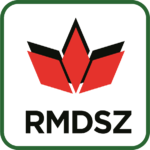 | |
| President | Hunor Kelemen |
| Leader in the Senate | Cseke Attila |
| Leader in the Chamber of Deputies | Korodi Attila |
| Founded | 25 December 1989[1] |
| Headquarters | Bucharest (presidency) Cluj-Napoca (presidency and executive presidency)[2] |
| Ideology | Hungarian minority interests[3] Liberal conservatism[4] Christian democracy Regionalism Pro-Europeanism[4] |
| Political position | Centre to centre-right |
| European affiliation | European People's Party |
| International affiliation | Centrist Democrat International |
| European Parliament group | European People's Party |
| Senate | 9 / 136 |
| Chamber of Deputies | 21 / 329 |
| European Parliament | 2 / 33 |
| Website | |
| www.dahr.ro | |
Officially considering itself a federation of minority interests rather than a party,[1] from the 1990 general elections onwards the UDMR has had parliamentary representation in the Romanian Senate and Chamber of Deputies. From 1996 onwards UDMR has been a junior coalition partner in several governments.
The party is a member of the European People's Party and Centrist Democrat International.
History
The UDMR was founded on 25 December 1989, immediately after the fall of the Communist dictatorship in the Romanian Revolution of 1989 to represent in public the interests of the Hungarian community of Romania. Its first president was the writer Géza Domokos.
The UDMR obtained consistent results during the 1990, 1992, 1996, 2000, 2004, 2008 and the 2012 elections, gaining representation in both houses of the Parliament, until 1996, the UDMR acted in opposition. From 1996 the party governed in a coalition with the Romanian Democratic Convention (Convenţia Democrată Română, CDR)—a wide centre-right alliance that won the elections that year—and obtained some positions in the government of Victor Ciorbea.
Four years later, the opposition party, the Social Democratic Party of Romania (PSD) won the 2000 elections. Although the UDMR did not join the new government as a coalition partner, it did sign a series of annual contracts with the PSD in which the PSD pledged to implement certain legal rights for the Hungarian minority community in return for UDMR's support in parliament.
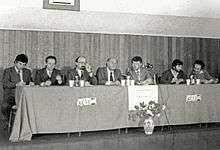
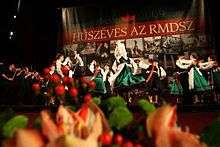
In the 2004 elections, the UDMR made an alliance to back Adrian Năstase of the Social Democratic Party, who was the favourite to win the presidential elections, but the surprise victory of Traian Băsescu rocked the Romanian political spectrum. After negotiations, the UDMR, together with the Romanian Humanist Party (later to become the Conservative Party), defected from the PSD alliance and pledged to form a coalition with the Justice and Truth Alliance. The UDMR obtained positions in the government. After the 2008 legislative elections UDMR entered in opposition. In 2009, after the adoption of a motion of no confidence against the Emil Boc's left and right grand coalition government, the UDMR became part of the new Emil Boc Cabinet, and continued after Emil Boc's resignation as junior coalition partner of the Mihai Razvan Ungureanu Cabinet together with the PDL and UNPR. In 2012 the Romanian Parliament voted a motion of no confidence against the Ungureanu Cabinet. After the formation of the Social Liberal Union (USL) government led by Victor Ponta, the UDMR entered the opposition. After the 2012 elections the same parties continued to form a government under the leadership of Victor Ponta. In 2014 the liberal part of the party coalition left the government, while the UDMR, PC and UNPR joined the new government. The UDMR left the government in December 2014, shortly after the landslide victory of Klaus Iohannis as President of Romania. Since 2014 the UDMR is in opposition.
Party organisation
Status
UDMR is not a legally registered political party, but takes part in elections under art. 4(2) of the Law 68/1992 which assimilates organizations representing national minorities to political parties from an electoral point of view. UDMR is an "alliance" of the ethnic Hungarian community in Romania, which incorporates several platforms of different ideologies, social, scientific, cultural or professional groups as associated organizations, youth and women organisations. The UDMR represents the Magyar (ethnic Hungarian) community of Romania (1,237,746 citizens, according to the 2011 census). Hungarians represent 18.9% of the total population of Transylvania;[6] in Szeklerland (Harghita, Covasna and part of Mureș counties) they form the majority. The overwhelming majority (99%) of the Hungarian population of Romania lives in Transylvanian counties (Arad, Bistriţa-năsăud, Bihor, Brașov, Alba, Harghita, Hunedoara, Cluj, Covasna, Caraș-Severin, Maramureș, Mureș, Satu Mare, Sibiu, Sălaj, Timiș). In national elections, the Alliance consistently obtains around 6% of the votes, which roughly corresponds to the percentage of ethnic Hungarian voters (6,5%).
Structure
The organization's president is Hunor Kelemen, elected at a party congress in 2011. Béla Markó, a writer, had held the position from 1993. He in turn was preceded by founding president Géza Domokos, in office from 1990 to 1993.
The UDMR is structured into 22 territorial organizations, covering all regions of Transylvania, the capital Bucharest, several counties outside Transylvania, as well as platforms representing different political ideologies (Christian Democratic, Socialist, Liberal, National Liberal). It has several associated partners and groups representing the civil society, or the social, scientific, artistic or professional domains. As decision-making bodies, the UDMR operates the Congress, the Council of Representatives, the Permanent Council and the Presidency The executive presidency is the executive body of the alliance. The consulting bodies of the alliance are: the Consulting Council of Regional Presidents, the Consulting Council of Platforms and the National Council of Self-governments. The bodies credited with controlling are the Regulation Control Committee, the Ethics and Disciplinary Committee. In addition, the President regularly convenes other consultative bodies such as the Economic Council and the Foreign Council.
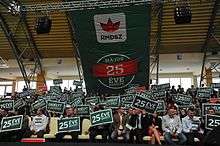
Doctrine
As an ethnic minority organization representing the Romanian Magyars the UDMR, above all, concerns itself with Hungarian minority rights, including cultural and territorial autonomy.
The most important objectives of the UDMR are the preservation and development of the Hungarian community in Transylvania, the achievement of the different types of autonomy: cultural autonomy for the smaller and most vulnerable communities and the territorial autonomy and self-determination for those living in large majority area. The use of the mother tongue in all segments of private and public life, the education in mother tongue, the administration of all establishments in the area of minority education and culture are the most important elements of the daily struggle of the UDMR.
The alliance has undertaken the task of representing the interests of the Hungarian community of Romania in Romanian and European politics as well. Ever since its establishment, the formation supported the necessity of a united political life, one single voice, that expresses the goals of the Hungarian minority in Romania. This is based on the principle that, as a minority, the Transylvanian Hungarian community should politically be represented by a single, united organization that would offer a framework for varied ideologies and not by various political parties. The UDMR seeks to establish equal to equal relations with Romanian and European political actors expecting their support in pursuing the goals of the Hungarian community. The UDMR is convinced the Hungarian community in Romania is the only entity entitled to make decisions concerning the Hungarian community in Romania.
The UDMR focuses on cooperation and dialogue with the majority. Participating in the governing coalition is important as the alliance can greatly contribute through governmental means to the improvement of the life of the Hungarian community in Romania. The presence and role in the Romanian government of the UDMR protects the status and future of ethnic minorities in Romania and safeguards their evolution. The presence of the UDMR in the Romanian government is not limited to benefits in the field of Romanian politics: the fact bears an important message for states in the vicinity of Hungary, where ethical issues have lately appeared to be increasingly problematic. Since 1999 the UDMR has been a member of the European People's Party (EPP), and since 1991 it is member of the Federal Union of European Nationalities (FUEN).
Various specific goals, gradually detailed during the years, include:
- Free use of mother tongue in private and public life, as well as in administration and justice.
- Development of a native-language school system, with all levels and all types of instruction.
- Full restitution of the community and Church-owned properties that were confiscated during the Communist regime.
- Autonomy and self governance for Szeklerland.
- Cultural autonomy for all national minorities in Romania (national minority law in the Romanian Parliament 2005).
- Decentralization of administration
The UDMR leaders have claimed on several occasions that they believe local autonomy (decentralization) to be the most appropriate and efficient form of self-government. However, the UDMR has also stated that it wishes to achieve this goal only through a dialogue and consensus with the Romanian majority, and based on proven Western European models.
The UDMR has been criticized on several occasions for its lack of specific doctrine. The main argument for preserving the current structure is that if it split up into smaller fractions of different ideological orientations, it would be impossible for the Hungarian community to obtain more seats in the Parliament (one single seat is allocated to each minority group by default) due to the electoral threshold of 5%.
Several voices from within the UDMR and the Hungarian community have criticized it for being too moderate, and making too many compromises in political treaties with other Romanian parties. The Hungarian Civic Alliance, formed by Hungarians against the UDMR, and the Hungarian People's Party from Transylvania formed by former members of the UDMR aimed to form separate, more radical, political entities. However, during the 2004 and 2008 elections, the UDMR has proved to still have the support of the overwhelming majority of Hungarians. Disputes with this fraction-group led to the departure of László Tőkés (who was in support of the break-away group) from the position of honorary president. In 2009 László Tőkés joined, as frontrunner, the Hungarian Unity list for the European Parliamentary elections in Romania, but as elected Member of the European Parliament, he became an independent politician and resigned from his UDMR membership.
Achievements
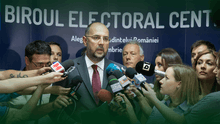
1989–1999:
- Developments in the educational system, including reclaiming for Hungarian-language education in some (though not all) schools that were transformed during the Communist regime.
- The law that allowed partial restitution of real estate confiscated during the Communist regime.
- Amendment to the administrative law, allowing for the use of Hungarian names of towns and villages as well as Romanian names (on public signs and indicators) where Hungarians live in numbers larger than 20%.
2000–2004:
- Adoption of restitution law of community forest, community and church real estates.
- Construction of new educational establishments, conservation of important historical buildings.
- Implementation of language rights in administration and justice.
- The inauguration of the symbolic Liberty (Szabadság) statue in Arad, demolished by the communist regime.
2004–2008:
- Establishment of the Institute for Minority Studies in Cluj.
- Establishment of new schools for professional education.
- Construction of sport establishments across Transylvania.
- The opening of the General Consulate of Hungary in Miercurea-Ciuc.
- Availability of a Hungarian language telephone directory.
2010:
- Decentralization process in the education and in health services.
- The History and Geography of Romania can be learned in mother tongue.
- The Hungarian language education benefits from more funding, the establishments are administrated by the local authorities.
2011:
- Important public investment were channeled into Hungarian led local communities, including sewage and water systems.
- The renewal of the 12 national road across Szeklerland.
- The UDMR managed to stop the intention of the political majority to create new and bigger administrative units, which would mint the diminution of Hungarian led counties.
2012–2013:
- The establishment of a Council for Cultural Autonomy, aiming to create a network of all goods and heritage of the Hungarian community in Romania.
- The UDMR presented the Transylvania 2020 project about the investment opportunities and development of the EU funding based on the 2014-2020 MFF of the EU.
- The UDMR together with the FUEN and the SVP from South Tyrol initiated the Minority SafePack European Citizens’ Initiative.
Electoral history
Legislative elections
| Election | Chamber | Senate | Position | Aftermath | ||||
|---|---|---|---|---|---|---|---|---|
| Votes | % | Seats | Votes | % | Seats | |||
| 1990 | 991,601 | 7.23 | 29 / 395 |
1,004,353 | 7.20 | 12 / 119 |
2nd | Opposition to FSN government (until October 1991) |
| Opposition to FSN-PNL-MER-PDAR government | ||||||||
| 1992 | 811,290 | 7.46 | 27 / 341 |
831,469 | 7.58 | 12 / 143 |
5th | Opposition to PDSR-PUNR-PRM government |
| 1996 | 812,628 | 6.64 | 25 / 343 |
837,760 | 6.82 | 11 / 143 |
4th | CDR-USD-UDMR |
| 2000 | 736,863 | 6.80 | 27 / 345 |
751,310 | 6.90 | 12 / 140 |
5th | Supporting a PDSR minority government |
| 2004 | 628,125 | 6.17 | 22 / 332 |
637,109 | 6.10 | 10 / 137 |
4th | DA-PUR-UDMR (until April 2007) |
| PNL-UDMR minority government | ||||||||
| 2008 | 425,008 | 6.20 | 22 / 334 |
440,449 | 6.39 | 9 / 137 |
4th | Opposition to PDL-PSD government (until December 2009) |
| PDL-UNPR-UDMR (until May 2012) | ||||||||
| Opposition to USL government (until December 2012) | ||||||||
| 2012 | 380,656 | 5.14 | 18 / 412 |
388,528 | 5.24 | 9 / 176 |
4th | Opposition to USL government (until March 2014) |
| PSD-UNPR-UDMR-PC government (until December 2014) | ||||||||
| Opposition to PSD-UNPR-ALDE government (until November 2015) | ||||||||
| Supporting Cioloș Cabinet (Ind.) | ||||||||
| 2016 | 435,969 | 6.19 | 21 / 329 |
440,409 | 6.24 | 9 / 136 |
4th | Supporting PSD-ALDE government (until August 2019) |
| Opposition to PSD minority government (until November 2019) | ||||||||
| Supporting PNL minority government (until February 2020) | ||||||||
Presidential elections
| Election | Candidate | First round | Second round | ||||
|---|---|---|---|---|---|---|---|
| Votes | Percentage | Position | Votes | Percentage | Position | ||
| 1996 | György Frunda | 761,411 | 6.0% | 4th | |||
| 2000 | György Frunda | 696,989 | 6.2% | 5th | |||
| 2004 | Béla Markó | 533,446 | 4.1% | 4th | |||
| 2009 | Hunor Kelemen | 372,761 | 3.83% | 5th | |||
| 2014 | Hunor Kelemen | 329,727 | 3.47% | 8th | |||
| 2019 | Hunor Kelemen | 357,014 | 3.87% | 6th | |||
Note
| Wikimedia Commons has media related to Democratic Union of Hungarians in Romania. |
- James P. Niessen (2005). "Romania". In Richard C. Frucht (ed.). Eastern Europe: An Introduction to the People, Lands, and Culture. ABC-CLIO. p. 767. ISBN 978-1-57607-800-6.
- UDMR statute Archived May 29, 2003, at the Wayback Machine (in Hungarian); UDMR contacts Archived May 14, 2003, at the Wayback Machine (in Romanian)
- Nordsieck, Wolfram (2016). "Romania". Parties and Elections in Europe. Retrieved 19 August 2018.
- "Democratic Union of Hungarians in Romania (UDMR)". Retrieved 4 August 2016.
- Zoltan Kantor (2008). "Institutionalizing nationalism". In Andrew M. Blasko; Diana Januauskiene (eds.). Political Transformation and Changing Identities in Central and Eastern Europe. CRVP. p. 74. ISBN 978-1-56518-246-2.
- (in Romanian) "Comunicat de presă privind rezultatele definitive ale Recensământului Populației și Locuințelor – 2011", at the 2011 census site; accessed 10 July 2013